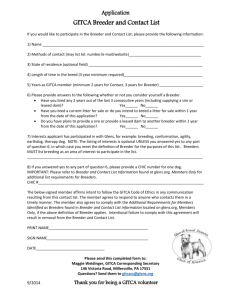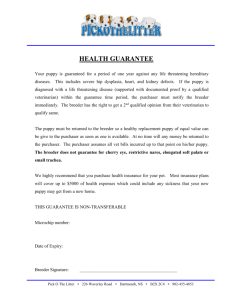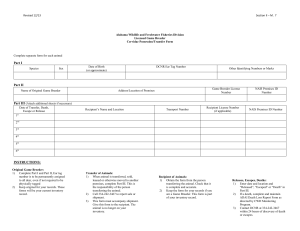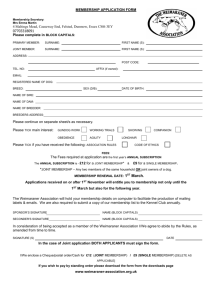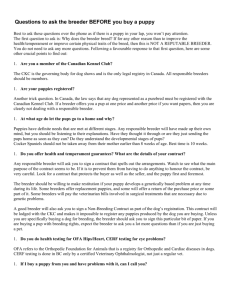Picking a dog breeder
advertisement
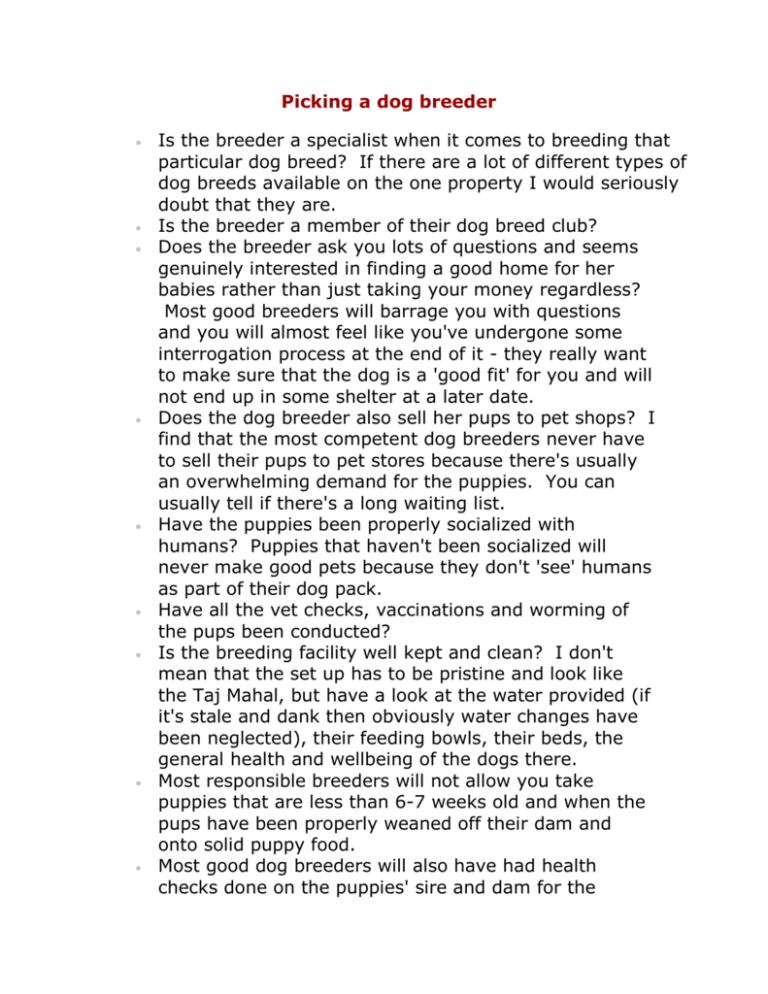
Picking a dog breeder Is the breeder a specialist when it comes to breeding that particular dog breed? If there are a lot of different types of dog breeds available on the one property I would seriously doubt that they are. Is the breeder a member of their dog breed club? Does the breeder ask you lots of questions and seems genuinely interested in finding a good home for her babies rather than just taking your money regardless? Most good breeders will barrage you with questions and you will almost feel like you've undergone some interrogation process at the end of it - they really want to make sure that the dog is a 'good fit' for you and will not end up in some shelter at a later date. Does the dog breeder also sell her pups to pet shops? I find that the most competent dog breeders never have to sell their pups to pet stores because there's usually an overwhelming demand for the puppies. You can usually tell if there's a long waiting list. Have the puppies been properly socialized with humans? Puppies that haven't been socialized will never make good pets because they don't 'see' humans as part of their dog pack. Have all the vet checks, vaccinations and worming of the pups been conducted? Is the breeding facility well kept and clean? I don't mean that the set up has to be pristine and look like the Taj Mahal, but have a look at the water provided (if it's stale and dank then obviously water changes have been neglected), their feeding bowls, their beds, the general health and wellbeing of the dogs there. Most responsible breeders will not allow you take puppies that are less than 6-7 weeks old and when the pups have been properly weaned off their dam and onto solid puppy food. Most good dog breeders will also have had health checks done on the puppies' sire and dam for the common diseases that that particular breed is prone to before they embarked on a breeding program eg hip dysplasia, retinal disease, cryptorchidism etc. They will have the documentation to prove it. Ask to view the parents of the puppies (some breeders will only be able to show you the dam because the sire is from another breeder) and take note of their behavior and how they relate to humans. Seeing their size and build will also help you determine if you like the proportions or build that the puppies will 'finish' off with. Most good breeders will actually ask you if you plan to breed from the dog. Whilst it's probably not something you think of initially, it's a good thing to really think through because good dog breeders will know which pups are better 'breeders' and which ones will just make nice pets and aren't really suitable to be bred. Most good dog breeders will take the pup/dog back from you if at any time you decide that you cannot keep it anymore - the extent of their devotion to their dogs goes that far. All pure bred puppies from dog breeders should have a proper Registration Certificate authorized by the appropriate governing dog body eg American Kennel Club etc. They should also have a pedigree chart and health record (vaccinations, worming done, diet that puppy has been on) that comes with them. Responsible dog breeders will also allow you to get another 3rd party opinion eg by your own vet (at your expense) as to the general health of the puppy of your choice and they will also agree to take the puppy back and offer a full refund if for some reason you aren't satisfied with the outcome. Know what you need to know Before you contact a breeder make sure you have done enough research that you can ask good questions and recognize good answers. Here are some questions you should be able to answer by the time you are actually looking for a breeder: 1. What size (height and weight) is correct for this breed? (For AKC breeds see http://www.akc.org, for non-AKC breeds contact the registering organization). o If the breed is not registered with AKC then use extra care. There are quite a few places that make money simply by issuing entirely meaningless papers. It is not always a simple matter to tell when a registry is worthwhile. You have to look at their registration requirements and their pedigree database. The purpose of a registry is to maintain pedigrees. That is to keep permanent researchable records of bloodlines. Pedigrees less than five generations deep are virtually worthless in establishing breed qualities such as predictability of type. 2. What are the grooming requirements? 3. How much time do I have to invest for exercise and what size yard is adequate? 4. What are the typical genetic diseases? How does a good breeder test for and avoid those diseases? Which of the diseases are a "must test for" and which are just a breeder going the extra mile? (This information can be hard to find. Check every breed club page you can find. Join breed specific discussion groups. See if you can find back issues of breed specific magazines.) 5. What are the most common reasons given for giving up this breed to rescue? This is perhaps the most important information you can get. If you understand why someone would give up their dog you can be prepared. Contact as many rescuers of the breed as you can and ask about the common reasons the match fails. This page only has a few rescue links http://www.dog-play.com/rescue.html but it will get you started. The above questions aren't intended to cover all you need to know before deciding whether a particular breed is right for you. The purpose of knowing the answers to these questions is to help you identify a good breeder. If you can find the answers to these questions, so can any decent breeder. If the breeder gives you different answers than your research supports uh oh red flag. Your questions will have a lot different feel during the exploring stage than later when you are focused on looking for that pup. Take notes, follow-up Take notes. It is really hard to think and talk at the same time. When you are new to something the information you hear may seem reasonable, until you think about it later. By taking notes you can research anything that doesn't seem right. You can also ask non-judgmentally for clarification. You want these to be "yes" 1. Were the puppies born on the premises? 2. Does the breeder insist that the puppies be at least seven weeks before being placed? 3. Did the breeder seem happy that you are asking questions? 4. Did the breeder ask you lots of questions? Questions about your lifestyle, family, experience with dogs and other pets, why you wanted a dog? Did you feel a bit like you were applying for a million dollar mortgage? 5. Did the breeder ask you whether you planned on breeding? 6. Will the breeder be available to offer advice and support for as long as you have the dog? 7. Does the breeder make you feel comfortable calling for advice? 8. Did the breeder go over some of the problems some people have with the breed? 9. Is the breeder a member of a breed club? (An organization sharing information on the breed) 10. Are the sire and dam each at least two years old? 11. Were both sire and dam tested for any genetic health problems before the breeding? 12. Does the breeder have information on the health testing of most of the immediate relatives of the sire and dam? 13. Did the breeder volunteer information on the health testing, and volunteer proof? 14. Does the breeder offer a guarantee against genetic health problems? 15. Did the breeder explain that a guarantee is not a promise that a genetic health problem won't occur, but a promise about what will happen if it does? 16. Is the guarantee at least two years long? 17. Does the guarantee allow you to keep the dog? 18. Does the guarantee allow you to choose at least a partial refund instead of another dog? 19. Is the dam a family pet (meaning does she live in the house as part of the family)? (For that matter does the breeder know what a "dam" is?) 20. Have the puppies been introduced to children? To other animals? 21. Is the breeder concerned enough about the welfare of the dog to promise to take it back (no matter how old) if you can't keep it? (Not necessarily pay you, the purpose is to avoid the shelter, ensure good placement) 22. Does the breeder believe it is important to keep in contact with puppy buyers to verify the level of success in producing a healthy dog of correct temperament? 23. Does the breeder intend to follow up on the dog as it matures and ages? You want these to be "no" 1. Did the breeder state or imply that puppies would be arriving from off premises? (e.g. shipped in soon) 2. Will the breeder agree to sell a puppy less than 7 weeks old? 3. Was the breeder reluctant to answer questions? 4. Did the breeder seem to be defensive in answering questions? 5. Does the breeder charge different prices for dogs with or without papers? 6. Did the breeder claim that his or her lines were entirely free of genetic health problems? 7. Do you feel pressured into buying a puppy? Do you feel like the breeder is trying to "sell" the puppy (as in persuading you to buy)? 8. Does the breeder promote the puppies as gifts or offer some special incentive in price to encourage a sale? 9. Does the breeder have more than two breeds available? 10. Does the breeder charge different prices depending upon the sex of the puppy? 11. If the breeder advertises do they seem to focus on superficial qualities like color or size while ignoring health testing? 12. Does the guarantee require the dog die or be euthanized because of the health problem? 13. Does the health guarantee require that you return the puppy? 14. Is the guarantee limited to a replacement puppy from the same breeder? Wow! Do all those answers really have to be "correct"? That's up to you and your standards. What is listed is the bare minimum that some would accept. There is actually a lot more required to feel comfortable supporting a breeder. But this is a list that was just "yes" or "no". However, these are merely suggested standards. You have to decide your own standards. If you don't think a point is important then don't require it, simple as that. The list is mainly for people who don't know about the issues in the first place. And it is for people who don't know they can demand much more than they get from a pet shop, for much less than it will cost them at a pet shop. That's the basic difference between the person who breeds for income, and the one who breeds because they love the breed. The primary concern of the first type is to avoid losing money, if they lose too much they are out of business. The primary concern of the second type is the dogs. They expect to lose money. For them breeding is a passion, not a business.
